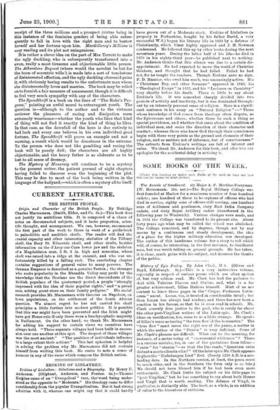ERSKINE OF LINLITHEN.
Erskine of Linlathen: Selections and a Biogravhy. By Henry F. Andersen.. (Oliphant, Anderson, and Ferrier. 6s.)—Thomas Erskine came of an "Evangelical" race, the word being under- stood as the opposite to " Moderate." His theology came to differ considerably from the popular Evangelicalism. But it had strong affinities with it, whereas one might say that it could hardly have grown out of a Moderate stock. Erskine of Linlathen (a property in Forfarabire, bought by his father David, a very successful W.S.) began his literary life in 1820 by a defence of Christianity, which Vinet highly approved and J. H. Newman condemned. He followed this up by other books during the next seventeen years. During the latter half of his life—he died in 1870 in his eighty-third year—he published next to nothing. Mr. Anderson thinks that this silence was due to a certain dis- appointment. He had expected to move the world of Christian thinkers, and thought that he had failed. Failed he had not, for he taught the teachers. Though Erskine gave no sign. F. D. Maurice, who owed him much, was unceasingly active. His " Christmas Day, and other Sermons" appeared in 1843, his "Theological Essays" in 1853, and hie "Lectures on Casuistry" very shortly before his death. There is little to say about Erskine's life. It was somewhat sharply divided into two periods of activity and inactivity, but it was dominated through- out by an intensely personal sense of religion. Here is a signifi- cant sentence in his essay on "Natural Religion " :—" Those whose knowledge of God comes from theology often dispute, as the Epicureans and others, whether there be such a thing as special providence, and whether God cares about the condition of individual men, and seeks the direction of their character and conduct ; whereas those who know God through their consciences begin with these very points as the ground and elements of their religion, and as matters not of inference, but of consciousness." The extracts from Erskine's writings are full of interest and value. We thank Mr. Anderson for this book, and offer him our apologies for the accidental delay in noticing it.


































 Previous page
Previous page